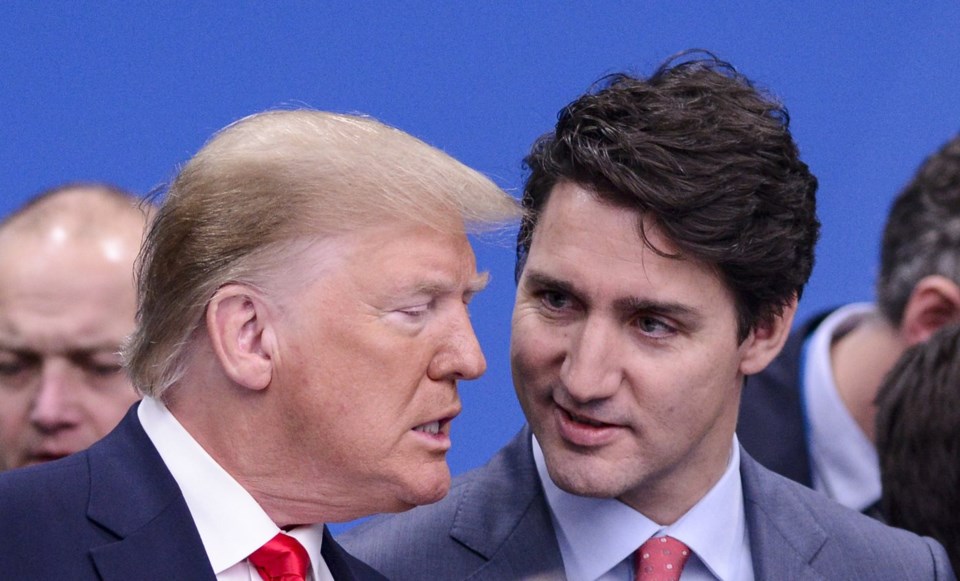OTTAWA — President-elect Donald Trump mockingly referred to Prime Minister Justin Trudeau as the governor of the "Great State of Canada" on his social media account early Tuesday.
Trump said in a taunting post on Truth Social it was a "pleasure to have dinner" with Trudeau at his Mar-a-Lago estate and that he looks forward to seeing the "governor again soon" to talk tariffs and trade, the "results of which will be truly spectacular for all."
Turns out, some Canadians think that's not such a bad idea.
A new Leger poll suggests 13 per cent of Canadians would like the country to become the next U.S. state.
The demographic breakdowns show there's higher support among men, at 19 per cent, compared with only seven per cent of women.
Conservative party supporters came in at 21 per cent, while one in 10 Liberal voters said they were in favour of the idea. The People's Party of Canada showed the highest level of endorsement among the federal parties, at 25 per cent, while the NDP was the lowest at six per cent.
A full 82 per cent of respondents said they were opposed to the idea. People in the Atlantic provinces, women and Canadians over the age of 55 were least likely to support it.
"I'm not shocked," said Andrew Enns, executive vice president of central Canada at Leger. While it’s not a question he’s polled on before, since it's not normal for U.S. presidents to openly muse about snatching up bordering countries as new states, the survey results follow some familiar patterns.
"Women have, for quite some time, whenever Donald Trump's name has come up, expressed a much stronger opposition to the individual," he said. "But again, we are talking about fairly small (support). In the Prairies, for example, it's still less than 20 per cent that would say, yes, they'd be open to joining the United States."
Leger surveyed 1,520 people between Dec. 6 and Dec. 9, and the results do not have a margin of error since online polls aren’t considered truly random samples.
The survey was also done before Trump made his post on Tuesday. Enns said he suspects Trump doubling down on the comments will further shrink the already limited public support by pushing the joke past the point of comfort.
Immigration Minister Marc Miller expressed dismay when reporters asked him about it ahead of a federal cabinet meeting Tuesday.
"It sounds like we're living in an episode of South Park," he said. "I don’t think we should necessarily look on Truth Social for public policy."
The provocative 1999 South Park animated film notably featured a song called "Blame Canada!" about Americans scapegoating their northern neighbours for their own domestic problems.
Miller and other cabinet members have written off Trump's comments as anything but serious.
"Clearly, he's joking," Defence Minister Bill Blair said Tuesday. "We're a sovereign nation."
Public Safety Minister Dominic LeBlanc attended Trudeau's surprise dinner with Trump at Mar-a-Lago last month, which came soon after the president-elect threatened to impose a 25 per cent tariff on imports unless Canada beefs up its border.
LeBlanc has insisted Trump was only teasing when at the dinner he suggested he could make Canada the 51st U.S. State.
"The president was telling jokes," LeBlanc said a week ago. "The president was teasing us. It was, of course, on that issue in no way a serious comment."
Trump later shared a seemingly AI-generated image of himself standing on a mountain ridge with a Canadian flag planted in it, with the caption "Oh Canada!"
Trudeau has not matched that tone, warning in a talk on Monday that the steep tariffs Trump is bandying about would be devastating for the Canadian economy. He described Trump's approach as an attempt to destabilize negotiating partners by introducing a bit of chaos.
Trudeau blew past the TV cameras on his way into Tuesday's cabinet meeting without stopping to talk to reporters.
Deputy Prime Minister Chrystia Freeland, meanwhile, deflected questions about whether she thinks Trump is serious about taking over her country.
"That is a question, really, for the president-elect," she said.
This report by The Canadian Press was first published Dec. 10, 2024.
Kyle Duggan and Jordan Omstead, The Canadian Press

.jpg;w=120;h=80;mode=crop)

